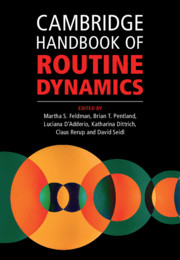Book contents
- Cambridge Handbook of Routine Dynamics
- Cambridge Handbook of Routine Dynamics
- Copyright page
- Contents
- Figures
- Tables
- Contributors
- Preface
- Chapter 1 What Is Routine Dynamics?
- Part I Theoretical Resources for Routine Dynamics Research
- Chapter 2 Practice Theory and Routine Dynamics
- Chapter 3 Process Theorizing and Routine Dynamics
- Chapter 4 Ethnomethodology and Routine Dynamics
- Chapter 5 Pragmatism and Routine Dynamics
- Chapter 6 Actor-Network Theory and Routine Dynamics
- Chapter 7 Materiality and Routine Dynamics
- Part II Methodological Issues in Routine Dynamics Research
- Part III Themes in Routine Dynamics Research
- Part IV Related Communities of Thought
- Author Index
- Subject Index
- References
Chapter 5 - Pragmatism and Routine Dynamics
from Part I - Theoretical Resources for Routine Dynamics Research
Published online by Cambridge University Press: 11 December 2021
- Cambridge Handbook of Routine Dynamics
- Cambridge Handbook of Routine Dynamics
- Copyright page
- Contents
- Figures
- Tables
- Contributors
- Preface
- Chapter 1 What Is Routine Dynamics?
- Part I Theoretical Resources for Routine Dynamics Research
- Chapter 2 Practice Theory and Routine Dynamics
- Chapter 3 Process Theorizing and Routine Dynamics
- Chapter 4 Ethnomethodology and Routine Dynamics
- Chapter 5 Pragmatism and Routine Dynamics
- Chapter 6 Actor-Network Theory and Routine Dynamics
- Chapter 7 Materiality and Routine Dynamics
- Part II Methodological Issues in Routine Dynamics Research
- Part III Themes in Routine Dynamics Research
- Part IV Related Communities of Thought
- Author Index
- Subject Index
- References
Summary
The ideas of classical pragmatists receive increasing attention by scholars working in diverse fields, who realize their fertility in addressing contemporary theoretical and practical challenges. Pragmatism, as a philosophical perspective, embraces a processual view of the world according to which what really exists is ‘in the making,’ in a process of becoming, and places great attention to action and its meaningful experience. In this chapter, I introduce the common themes in the work of the founding figures of classical pragmatism and examine their convergence with the theoretical assumptions underpinning routine dynamics theorizing. I trace the influence of pragmatism in routine dynamics research and suggest that pragmatist thinking has much to offer to the study of routines as dynamic, processual phenomena.
- Type
- Chapter
- Information
- Cambridge Handbook of Routine Dynamics , pp. 62 - 72Publisher: Cambridge University PressPrint publication year: 2021
References
- 4
- Cited by

